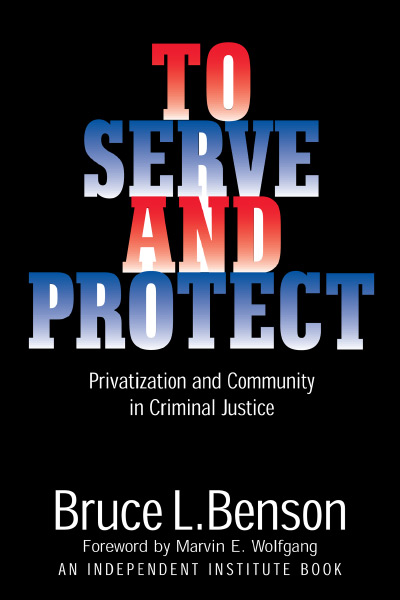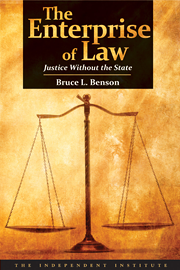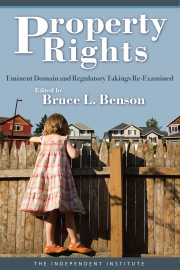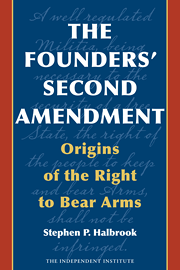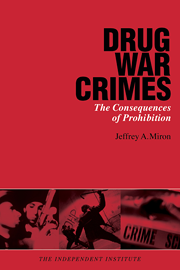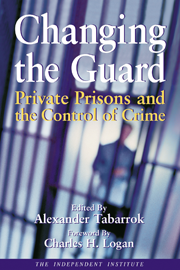| List Price: | ||
| Price: | $24.95 | |
| Discount: | $40.05 (Save 62%) |
| List Price: | ||
| Price: | $24.95 | |
| Discount: | $40.05 (Save 62%) |
Overview
Government police forces, prosecutors, courts, and prisons are all historically recent developments. Prior to their development, community-based and private systems handled many matters that are today referred to the government criminal justice system. With the increasing size, complexity, expense, and unresponsiveness of the government criminal justice system, attention is once again being given to private alternatives.
In this book, Benson transcends the policies of liberals and conservatives that have supported government’s traditional role in criminal justice. With lucidity and rigor, Benson examines the gamut of private-sector inputs to criminal justice, ranging from private-sector outsourcing of prisons, security, and arbitration to full “private justice” such as business and community-imposed sanctions, crime prevention, and increased private security and self-defense.
This book examines how private justice measures are a traditional response to government failure in crime prevention and justice. To reduce crime and protect civil liberties, Benson weighs the benefits and liabilities of various levels of privatization, offering correctives for the current gridlock to make criminal justice truly accountable to the citizenry and simultaneously reduce the unchecked power of government.
Award:
Sir Antony Fisher International Memorial Award (2000)
Contents
- Foreword
- Chapter 1: Introduction
- Chapter 2: Partial Privatization: The Level and Scope of Contracting Out in Criminal Justice
- Chapter 3: Potential Benefits and Pitfalls of Contracting Out in Criminal Justice
- Chapter 4: Private Inputs into “Public” Arrests and Prosecution: Vital but Reluctant Victims and Witnesses
- Chapter 5: The Level and Scope of Private Production of Crime Prevention and Protection
- Chapter 6: Private Justice in America: Historical Precedent and Modern Reality
- Chapter 7: The Benefits of Privatization: Theory and Evidence
- Chapter 8: Alleged Market Failures in a Privatized System of Criminal Justice: Are They Valid?
- Chapter 9: Why is the Public Sector So Involved with Criminal Law Today? A Theoretical and Historical Analysis
- Chapter 10: Restitution in a Rights-Based Approach to Crime Policy: Individual Responsibility and Justice for Victims
- Chapter 11: Encouraging Effective Privatization in Criminal Justice, Part I: Prevention and Pursuit
- Chapter 12: Encouraging Effective Privatization in Criminal Justice, Part II: Prosecution and Punishment
Detailed Summary
- While modern criminal justice has been viewed primarily as properly a government concern, Bruce Benson demonstrates that, for many centuries, crime control was almost entirely private and community-based. Government police forces, prosecutors, courts, and prisons are all recent historical developments results of a political and bureaucratic social experiment which, neither protects the innocent nor dispenses justice.
- Citizen policing and neighborhood watches have been shown to effect dramatic drops in crime. In the Mantua section of Philadelphia, a citizen patrol unit called Mantua against Drugs helped bring crime rates down 40 percent between 1989 and 1993.
- The lack of victim restitution may have a major impact on the under-reporting of crimes. According to the Bureau of Justice, only about 39 percent of Schedule I crimes, such as Murder, robbery, and rape, are ever reported.
- Victims who participate in private arbitration programs, such as the victim-offender mediation (VOM) program, are much more likely to feel justice has been done than those who rely on the courts. In one study of VOMs, over 90 percent of mediations produced a settlement, and more than 80 percent of offenders paid restitution.
“Police have very little to do with crime when it comes down to it,” explains Tallahassee, Florida, Police Chief Tom Coe. “The community cannot put enough cops out there to protect everyone. You’ve got to empower the people to protect themselves.”
Responding to that call, To Serve and Protect suggests policy changes to mobilize citizens and lead to effective and efficient justice for crime victims. Taking an historical perspective, the book both documents the failures of the criminal justice system and shows how they can be corrected.
Ironically, despite its unparalleled importance as a policy issue, the public isn’t often treated to an in-depth analysis of the issues of crime and criminal justice. Instead, pundits and policy-makers have grown accustomed to giving pat answers and canned excuses, with those on the left stressing gun control measures and government rehabilitation programs as solutions, while those on the right advocate building more prisons, mandating more punishments and getting “tougher” on drugs.
In this new book from The Independent Institute, Benson shows how both ends of the political spectrum get the issue wrong and neglect perhaps the core of the debate: the crucial role the private sector and local community institutions have played and must continue to play in controlling crime.
Private JusticeIn questioning the role of government in criminal justice, Benson leaves no stone unturned as he explores the gamut of private-sector criminal justice solutions: from outsourcing of government functions such as prisons and corrections, security, and arbitration to full-scale “private justice” initiatives, such as business and community-imposed sanctions, citizen crime prevention, and increased private security and self-defense.
Privatizing and outsourcing more criminal justice programs and lifting licensing and regulatory restrictions that discourage more private firms from entering the industry will not only seriously cut costs associated with the criminal justice system, but will offer greater accountability and serve to control unfortunate abuses of police power.
Searching for the most cost-effective methods of both reducing crime and protecting civil liberties, Benson weighs the benefits and liabilities of various levels of privatization and offers a comprehensive system to end the current gridlock. The result is a plan that not only makes criminal justice truly accountable to the citizenry, but also simultaneously fights the dangers inherent in the unchecked power of government.
No Justice, No PeaceIn studying successful criminal justice systems, Benson also shows that an effective system should have victim restitution, rather than criminal punishment, as its primary focus. Victims advocacy groups should be made more aware of policy changes that would help realize this goal, including privatized collections, allowing private arbitrators to deal with criminal cases by determining restitution awards, and expanding the market for prison labor to not only cover operating expenses, but to increase restitution awards.
For instance, prior to prosecution, most Japanese criminals bargain with their victim through a mediator, and offer to pay restitution so that the victim will not demand further punishment. Few offenders receive government imposed penalties on top of their restitution, yet criminal offenses are substantially lower than in any other industrialized country, and Japan remains the only country whose crime rates have fallen continuously since World War II.
A History of VigilanceAmerica has a long history of private actions to restore order when local governments have been to inept or corrupt to control crime. Modern versions of such “vigilance” include the Fairlawn Coalition or “Orange Hats” of the Anacostia section of Washington, D.C. and “Mantua Against Drugs” in Philadelphia, community organizations that take proactive approaches to cleaning crime out of their neighborhoods. Other examples range from crime watches to community or building patrols to privatization of formerly public streets in order to limit access to fully-privatized gated communities.
Benson explores the wide array of private activities that have developed to protect individuals and their property are explored, including everything from participatory neighborhood actions, to individual investments in tools of protection, to the market for private police and security equipment. Both historical and current examples of private justice in America are explored in order to demonstrate that private justice is a traditional American response to government failure.
To Serve and Protect makes clear the choice policy-makers face is not whether or not to “allow” privatization. It is between encouraging and supporting the privatization trend, or attempting to thwart it, thereby perhaps slowing its evolution and diverting its path, but without stopping it. Some cost-effective developments (e.g., private markets for criminal labor, formal private courts) can certainly be prevented, but as history conclusively shows, since governments cannot adequately protect citizens, the public will and should take justice into its own hands.
Praise
“Like other Americans, I am most interested in crime reduction and prevention, and Benson has performed a signal service in To Serve and Protect.”
—Griffin B. Bell, former Attorney General of the United States
“In his introduction to this book, Marvin Wolfgang says bluntly, ‘The public criminal justice system must be classified as a failure system.’ How public should justice be? In To Serve and Protect, Bruce Benson pursues Wolfgang’s argument deep into territories which, in countries that lack America’s ingrained scepticism about governmental power, will seem alarmingly heretical. The best thing about Benson’s book is that he turns the usual liberal arguments upside-down. However much money we pump in, the police cannot do everything. And perhaps they should not be asked to. Bruce Benson concludes that the policy-makers’ choice ‘is not between privatization and no privatization.’ It is about how to shape the trend: ‘privatization will not be stopped’.”
—London Times Literary Supplement
“To Serve and Protect is extremely informative and valuable, chock full of information and a pleasure to read. I learned an immense amount from the book.”
—Richard B. Freeman, Program Director, Labor Studies, National Bureau of Economic Research
“Benson’s analysis and evaluation of the option is powerful and requires all honest analysis to stop, look and think again. To Serve and Protect is an important book that deserves the widest attention—and most vigorous debate—possible.”
—John J. DiIulio, Jr., Professor of Politics and Public Affairs, Center for Domestic and Comparative Policy Studies, Princeton University
“Well-written and provocative, To Serve and Protect should be read by criminal justice professionals and academicians with the perspective that Benson offers valid criticisms of the public sector’s handling of criminal justice and offers some recommendations that warrant consideration.”
—Law and Politics Book Review
“The United States today delivers law and order in the same socialist manner that the USSR delivered food and shoes--and with comparable results. We can do better. In his provocative yet practical book, To Serve and Protect, Bruce Benson shows how to harness the productive power of competition and choice to deliver police, courts, and sanctions geared to protect individuals and their rights, rather than the prerogatives of the law enforcement bureaucracy. He considers both radical and incremental reforms and chronicles the real-world benefits that have been achieved where they have been implemented. Anyone concerned with crime and justice should study these recommendations carefully.”
—Randy E. Barnett, Austin B. Fletcher Professor of Law, Boston University
“Economists as a group are generally sympathetic to the cause of privatization, but most would likely concede that law enforcement and national defence are matters for public provision. To Serve and Protect by Benson attempts to shatter such a consensus and urges readers to think seriously of privatizing not only policing, but corrections and prosecutions as well. The book builds a case for the feasibility of supplanting the entire law enforcement system with private markets and community action by examining aspects of criminal justice that are already largely private or that rely heavily on private inputs. Consequently, the chapters encompass a diverse array of subjects, all of which are meant to illustrate the potential for such a scheme. . . . The ability of Benson's book to generate such Swiftian speculations is an indication of its success in expanding the reader's perspective on the appropriate structure of criminal justice, but that the reader is left to flesh out how these new institutional arrangements can be established, or why they cannot be, is a reflection of its shortcomings. Some will be unconvinced by the book, but all will find it provocative.
—Economica
“To Serve and Protect serves as a wake-up call as to how far government has monopolized society’s efforts toward ensuring civil behavior. The often draconian criminal justice system has steadily replaced informal community efforts preventing crime with a costly bureaucratic maze that fails to protect and leaves citizens increasingly fearful of violence.”
—Joseph D. McNamara, Senior Fellow, Hoover Institution, Stanford University; former Chief of Police, San Jose, California, and Kansas City, Missouri
“Some of the brightest prospects for reform have included community policing, privatization, and civilianization throughout the justice system, and a variety of intermediate sanctions, including mediation and restitution. To Serve and Protect casts a bright, if unorthodox light on these matters. It takes a long step toward offering a coherent framework for analyzing them. His core thesis is provocative and straightforward: the criminal justice system should reorient itself away from the arena that pits state against defendant and should aim, rather, to serve the rights of the victim. . . . The reforms in ends and means that Benson proposes may offer an extraordinary opportunity to make good on both liberal and conservative attempts to combine elements of private sector efficiency with sensitivity and real justice. Benson’s thesis is supported by a trove of compelling observations, anecdotes, and conjectures. Benson’s central argument for a shift to a more effective system if victim restitution, along lines that resemble our tort system, has the potential for revolutionizing a flawed criminal justice system by offering a more coherent framework of justice and reducing the costs of crime and justice. It warrants serious consideration, especially on the property crimes side.”
—Social Service Review
“Bruce Benson;s book, To Serve and Protect, will cause readers to rethink their preconceived notions of not just what law enforcement services can be contracted out but also when government involvement is even desirable. The book is as comprehensive as it is bold, and it does not shy away from difficult questions. Benson’s effort in drawing all these different sources together has done us all a great service.”
—John R. Lott, Jr., Research Fellow, American Enterprise Institute; former Chief Economist, U. S. Sentencing Commission
“In To Serve and Protect, Bruce L. Benson, the DeVoe Moore Distinguished Professor of Economics at Florida State University and Senior Fellow at The Independent Institute, advocates full privatization of criminal justice. In doing so, he goes beyond most contemporary discussions of contracting out for service or service components, most commonly focused on policing and corrections. Contracting out involves privatization of supply, but generally in the context of collective demand; Benson would privatize demand as well as supply and would extend privatization to prosecutorial and judicial functions. . . . Benson provides an impressive catalog of supply-side privatization: contracts among local governments and with private firms for policing; the growth of private security; private prosecution; 'rent-a-judge'options; and privately operated prisons. He catalogs demand-side privatization too, especially self-help, target-hardening, and small-scale collective action by co-residents. His catalogs summarize a great deal of the relevant literature, albeit the literature of privatization proponents. Benson also catalogs the many critiques of privatization of criminal justice, focusing most attention on supply-side critiques. For each he offers a rebuttal, most frequently based in the positive discipline imposed by competition in open markets. He cites repeatedly instances where the ill-effects anticipated by those opposed to privatization are found in the current public system including corruption and cronyism, brutality, inequitable service, and constitutional violations. Benson sees no reason to believe these would be more prevalent in a fully privatized system and much hope that they would be reduced. . . . Benson writes from an avowedly Public Choice perspective, basing much of his critique of bureaucracy, for example in the work of Niskanen.”
—Journal of Politics
“To Serve and Protect focuses on critical issues existing in law enforcement such as corruption and competition for resources, and this important book stimulates a spirited discourse on how privatizing could address these concerns.”
—Hubert Williams, President, The Police Foundation; former Chief of Police, Newark, New Jersey
“Bruce Benson’s work on crime and how we try to prevent it has for years represented the most innovative work in this area. Noting that our existing institutions have not worked, he challenges the conventional wisdom about crime prevention at every turn. Benson’s work is not just provocative substantively, but accessible methodically to everyone—sociologists, lawyers, economists, political scientists—anyone interested in what has become perhaps the biggest problem in American society today.”
—Fred S. McChesney, Class of 1967 James B. Haddad Professor of Law, Northwestern University
“The root solution for crime is institutions that get incentives right, or at least close to right. Custom and law must internalize (privatize) more benefits for crime suppressors and make crime producers pay more of the costs they impose on victims. Bruce Benson pursues this logic brilliantly. . . . Benson’s work is solidly anchored in historical reality. . . . Benson’s daring conclusion—privatize both the demand for and the supply of criminal justice services— leaves us with a wealth of provocative diagnoses and examples for further research. In To Serve and Protect, Benson has given us a breakthrough book.”
—Public Choice
“In To Serve and Protect, Bruce Benson, a leading authority on the privatization of criminal justice, challenges us to rethink the boundaries (and even the need for boundaries) between public and private action in ‘doing justice.’ This book is perhaps the best and certainly the most comprehensive comparison of public versus private criminal justice to date. Benson examines the different incentives that influence public and private actors and how they affect not only efficiency but—more importantly—liberty and justice as well. Benson shatters the myth that enforcing laws and dispensing justice have been, now are, or ever should be the complete monopoly of government.”
—Charles H. Logan, Professor of Sociology, University of Connecticut
“To Serve and Protect brings balance and understanding to the hotly argued issues of what are the proper roles of the private sector and of privatization in the prevention and treatment of crime and criminals. Its impact on police, on courts, or prisons and probation departments, and on citizens interested in efficiency and decency in criminal justice, should be profound.”
—Norval Morris, Professor of Law and Criminology Emeritus, University of Chicago
“Bruce Benson should be congratulated for pointing out the actual importance of private activity in crime-control as well as the potential for an expansion of such activity. To Serve and Protect will stimulate some useful thinking on the subject.”
—Philip J. Cook, Director, Sanford Institute of Public Policy, Duke University
“Benson is a veteran researcher on crime and law, and in this volume he integrates a sprawling literature in a way that changes the whole discussion. To Serve and Protect works on two distinct levels. First, it provides nearly encyclopedic coverage of private techniques in criminal justice that range from medieval Anglo-Saxon days to contracting out of prisons today. Second, and more important, it elevates us to a high philosophical plane by redirecting our attention from social-engineering goals like deterrence and rehabilitation toward a focus on justice and individual rights and responsibilities . . . Benson’s daring conclusion—privatize both the demand for and the supply of criminal justice services— leaves us with a wealth of provocative diagnoses and examples for further research. Benson has given us a breakthrough book.”
—The Freeman
“Those seeking a useful compendium of every pro-private sector, anti-government position surrounding criminal justice need look no further. To Serve and Protect provides ready solace to anyone disillusioned with public dispensed justice. It draws upon the author’s and other extensive research. . . . The book is articulate, takes forceful stands but, at the same time, takes no prisoners as it extols the superiority of the private marketplace in the definition and distribution of justice. He amasses a vast amount of evidence to demonstrate how many criminal justice agencies succumb to self-aggrandizement, sacrificing efficient, effective and equitable public justice. Forceful arguments are offered on behalf of numerous private sector initiatives that primarily focus on individual rights and responsibilities and mediation, particularly a right to restitution for victims and a responsibility to pay for offenders. Benson offers a compelling case for a strengthened victim role in the restitution process. . . . This volume is an economic analysis of justice— a valuable sourcebook of the rationale and justification of many important private sector criminal justice improvements As such, in the final analysis it sheds much glowing light on privatization’s attributes but casts great shadows on all aspects of public sector activities.”
—New York Law Review
“In criminal justice, there are alternatives manifested in two visions of 'community justice.' Both seek to diminish the role of the state as sole arbiter of justice and crime control. On vision, however, relies upon the market in lieu of the state, and promotes privatization of justice services. The second relies upon the normative institutions of a civil society. Bruce Benson's recent book, To Serve and Protect, promotes the market-based vision, but speaks often, though more quietly, to the second vision as well. In this comprehensive and well-documented text, an economist promotes the cause of his discipline, but also expands its boundaries. Where I expected this libertarian approach to state-based criminal justice to consistently conflict with a communitarian alternative, I was surprised by the frequency of my own sympathetic reactions. Perhaps, complementarity might supersede conflict in the cause of criminal justice reform. . . . Benson argues forcefully for returning the crime victim to the center of the justice process, and this is wholly consistent with emerging community justice and restorative justice philosophies. . . . To Serve and Protect provides a detailed account of privatization in the criminal justice system — what has occurred in the past, what currently exists, and possibilities for the future. It is a substantial and coherent work that provides theory with evidence. . . . Perhaps moral and economic theories are not mutually exclusive solutions to the commons dilemma.”
—The Responsive Community
“Critics of privatization often contend that for-profit firms cut corners and reduce quality. A primary purpose of To Serve and Protect is to explore the validity of such critiques. Chapters discuss evidence for the benefits of privatization, alleged market failures in privatized systems, and effective privatization in prevention, pursuit, prosecution, punishment, restitution, and rehabilitation. This book is a well-informed overview of the libertarian alternative.”
—Future Survey
“To Serve and Protect is a well written book. Benson has a lively and engaging style of writing. The book is well produced, with a thorough index. The extensive references provide a valuable resource for others interested in the economics of almost any aspect of criminal justice. Benson has thoroughly research and documented the book. He provides an exhaustive survey of factual information on everything from the operation of the modern bail bond system to the development of the criminal justice system in medieval England. Although this book is an economic analysis of criminal justice, it is remarkably free of economic analysis and mathematical obfuscation. Benson clearly and concisely explains each important economic concept he uses. A reader without a background in economics will find the book valuable as an introduction to economics as well as accessible as a policy analysis of criminal justice. While most of the book is an objective application of economic principles to issues of criminal justice, the final third is a series of policy prescriptions aimed at the primary audience for the book: people working to improve the criminal justice system. The book would also be useful in a law and economics course or in a criminal law seminar. Outside the academy, anyone interested in criminal justice issues will find the book provocative and an invaluable guide to the empirical criminal justice literature. Bruce Benson’s analysis suggests an alternative approach to these issues. A restitution-based, private criminal justice system offers a chance for the victims of crimes to secure justice. It offers neutral principles that guide the choice of conduct to criminalize. It promises efficiency in the delivery of the services. Come the revolution, many interest groups and individuals will not like the world to which Benson’s analysis points. Moralists who insist on criminalizing consensual conduct that does not harm third parties will be disappointed that the law cannot serve as a club against those with different beliefs. Political pressure groups will be frustrated that they cannot secure special treatment for their favorite cause. Those enamored with symbolic politics will be left unfulfilled by the focus on actual harms. Others will find much to cheer. Victims, and potential victims, of crimes will gain new opportunities for restitution. Individuals will find new opportunities to create wealth, either as entrepreneurs or as investors in, or employees of, entrepreneurs who fulfill private roles in the criminal justice system. Benson’s analysis also has much to offer short of a complete revolution in criminal justice. Understanding the importance of private inputs into the public provision of criminal justice services, and understanding the role of incentives in determining the level of those inputs, will enable policymakers to improve existing criminal justice systems. The book has a larger message as well. This is a case where economics has a clear contribution to make to the study of law. The contribution is made without jargon, without mathematical hand waving, and without the sacrifice of the English language. In short, this is what economists ought to be doing about law (and other topics). This book makes an excellent start at bringing the insights of economics on criminal justice issuers to a wider audience.”
—University of Chicago Law Review
“To Serve and Protect is the most important book on public policy to be published in a long time. Benson takes on the most pervasive government activity, the criminal justice system, and addresses the critical issue of our high crime rate. There are no clear ‘academic’ solutions to this problem, but Benson presents a clear and sensible solution derived from the insights of Austrian economics—the privatization of the criminal justice system. Small-government conservatives and law-and-order libertarians beware: this book will challenge your basic beliefs and ultimately change your mind about the role of government in the criminal justice system. Big-government civil libertarians and liberals face an even more difficult challenge because for them this book does not challenge their exception, but their rule that government should control the important institutions in society. This great book is highly recommended. Buy several copies, read one carefully, and give the rest to promising students, libraries, your statist friends, and favorite politicians.”
—Journal of Libertarian Studies
“Economist Bruce Benson takes a different tack in his new book, To Serve and Protect, from The Independent Institute, arguing in favor of a de-centralization and privatization of law enforcement rather than empowerment. Benson challenges whether crime control needs to be (at least exclusively) a government function. He points out that for many centuries the maintenance of public safety was entirely private and community-based. Benson, a pioneer in this area, explores several alternatives to the status quo: citizen policing, gated communities, private security, cooperation with business groups, victim restitution, private arbitration, contract courts, victim-offender mediation, self-defense, and privatized prisons. Some of these concepts (especially community patrols) have antecedents in American history, or (like restitution and mediation) are commonly used in other countries.”
—California Political Review
“Benson is a veteran researcher on crime and law, and in this volume he integrates a sprawling literature in a way that transforms the whole discussion. The book works on two levels. First, it provides nearly encyclopedic coverage of private techniques in criminal justice that range from medieval Anglo-Saxon days to contracting out of corrections today. Second, it redirects attention away from social engineering goals like deterrence toward a focus on justice and individual rights and responsibilities.”
— Business Economics
“Well written and provocative, To Serve and Protect should be read by criminal justice professionals and academicians with the perspective that he offers some valid criticisms of the public sector’s handling of criminal justice and offers some recommendations that warrant consideration.”
— Ruth Ann Strickland, Professor of Political Science and Criminal Justice, Appalachian State University
“In To Serve and Protect, Bruce Benson argues for privatizing the American legal system (including police, courts and Prisons) and adopting a revised version of the old Anglo-Saxon system under which crime victims have a right to restitution from criminals. Even if Benson’s scholarly and respectful manner of pleading for more justice from the American judicial establishment is in vain, and even if his facts and polite arguments turn out to be wasted on American opinion molders, his research still provides a lot of ammunition. Thanks to Benson’s research, this book is full of information of value to anyone.”
—Formulations
“Benson argues convincingly that greater private sector involvement in a state’s criminal justice system will make such a country a safer place to live in as the range of security products and services is enhanced by the private sector. Benson provides his African readers with thought-provoking ideas on how the private sector and communities can be empowered to fight crime without sacrificing civil liberties.”
—African Security Review
Author
Bruce L. Benson is Senior Fellow at The Independent Institute and DeVoe Moore Distinguished Research Professor of Economics at Florida State University.
Awards
2000 Sir Antony Fisher International Memorial Award (Awarded by the Atlas Economic Research Foundation)
- Winner in “Old Institute” Category

